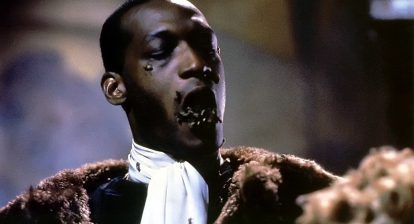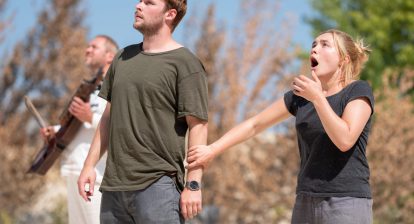Ari Aster’s debut feature, Hereditary, was not an easy watch. Relentlessly depressing and shockingly gory, it was the kind of movie that beats you into submission. The kind of movie you have to see but could probably never bring yourself to watch for a second time. It’s an important film but a difficult one. Now, if it’s possible, his sophomore effort, Midsommar, is an even tougher sell.
Actually, scratch that: this is an endurance test of a movie. Frankly, it will break you down and leave you a wreck on the floor. Right from its (beautifully shot!) devastatingly nihilistic prologue, there’s a sense nothing good will happen. Even before the weirdos in white start circling and force-feeding people raw fish, there’s an intense foreboding to the proceedings. The camera crawls along, enjoying the horror, getting right up in poor Florence Pugh’s face as she lets out a stream of guttural, unworldly howls.
Related: Hereditary is a Strikingly Accurate Comment on the Destructive Power of Grief
As it happens, she actually has a few more variations on those hysterical screeches, all of which she’ll have to employ over the course of the movie’s two and a half hour run-time. Pugh is Dani, a troubled young woman who, when she’s first introduced, is struggling to get any attention from her shitty boyfriend, Christian (Jack Reynor, recalling his oblivious upper crust prick from What Richard Did, except older and even more uncaring). This in spite of clear, ongoing family issues that culminate in the film’s first, big, heart in your stomach shock.

Christian reluctantly agrees to let Dani come away to Sweden with he and buddies Mark (Will Poulter, twisting his face into a near permanent smirk), Josh (The Good Place‘s William Jackson Harper) and the clearly meddlesome Pelle (Vilhelm Blomgren, darkly cherubic), who’s their all important in with a loony commune who farm their own food and only passingly consider incest a taboo. At first, it all seems fairly idyllic. There are free drugs, the women are Swedish and therefore stunning, and it never gets dark or cold even at nighttime. But then, after witnessing a horrific ritual event, the group slowly starts to realize all is not well in Sweden.
Midsommar is a confounding, disturbing, sickening, and gorgeously captured fairy-tale nightmare. Aster shows more visual flair here than he did in Hereditary, taking the massive risk of shooting in almost too-bright sunlight so there’s nowhere to hide. The location is stunning but in an off kilter, uncanny kind of way. Its horrors are many and varied but never predictable. In keeping with this being a breakup movie, by Aster’s own admission, the most horrifying sequence comes in the form of a betrayal. But there’s plenty of stomach-churning moments preceding it, always with lashings of gooey practical gore.
The score is a tingly, mewling, wretch of a thing, often played in camera by the locals and always throwing us off base. The whole film is disorientating, never settling into a groove. Even at a (too long) 140 minutes, it’s difficult to judge whether it’s nearing its conclusion, if it ever will. Aster isn’t interested in offering easy answers, even suggesting there’s an honor to death or suicide at one point, while character motivations remain muddy at best. This is a film that’s keenly felt, rather than just watched. It seeps in slowly but surely until there’s no escape from it.
The whole, horrible story is seen through Pugh’s eyes so she takes quite a beating here. Aster asks quite a lot of his leading lady but the young Brit who was so fantastic in The Falling, Lady Macbeth, and most recently Fighting With My Family — three roles that couldn’t have been more different — is more than up to the challenge. As the only decent human among a group of obnoxious lads, she takes the whole weight of the story on her shoulders. Midsommar starts with the camera right up in her face and Pugh gamely takes it on, giving everything she’s got until you fear she may be sucked dry (of course there’s always worse to come).

As her no good boyfriend, Reynor affects a disinterested distance making his underhanded jabs at Dani sting even worse. Poulter is gifted the movie’s only real moments of levity (“I’m so hungry! It’s like they’re trying to make it gross!” he complains) but he never goes all-out asshole. Harper plays a variation on Chidi but with slightly more backbone while Blomgren’s Pelle presents himself as both an escape and a life sentence to Dani, with whom he’s clearly smitten.
See Also: Hereditary Isn’t Perfect, But We Should Still Be Glad It Exists
But Midsommar belongs to Pugh. As much as everyone was upset Toni Collette wasn’t nominated for Hereditary, it’ll be even more of a shame if Pugh is left out come awards season. She’s absolutely astonishing here, laying herself completely bare while tapping into emotions actors twice her age would struggle to contend with. The movie may have been conceived and directed by a man, but it has a profoundly female energy, both in Dani’s character and in its ruthless dismantling of toxic masculinity.
Midsommar is not an easy movie to recommend and there will certainly be those who find its relentless pessimism exhausting. But this is next level horror film-making, the kind of scary movie that seeps into your bones and makes you feel cold, one that you can’t shake even when you step out into the light (actually, especially then). It does go a little Wicker Man towards the end but this is no bad thing — we were long overdue for another folk horror masterpiece (Blair Witch is 20 years old this year, god damn it!). Give in to its dark, poisonous pleasures and you’ll be richly rewarded. But good luck even meditating afterwards.
WICKED RATING: 8/10
Director(s): Ari Aster
Writer(s): Ari Aster
Stars: Florence Pugh, Jack Reynor, Will Poulter, William Jackson Harper
Release date: July 3, 2019
Studio/Production Company: B-Reel Films
Language: English
Run Time: 140 minutes
Follow us on social media: Twitter | Facebook | Inst







